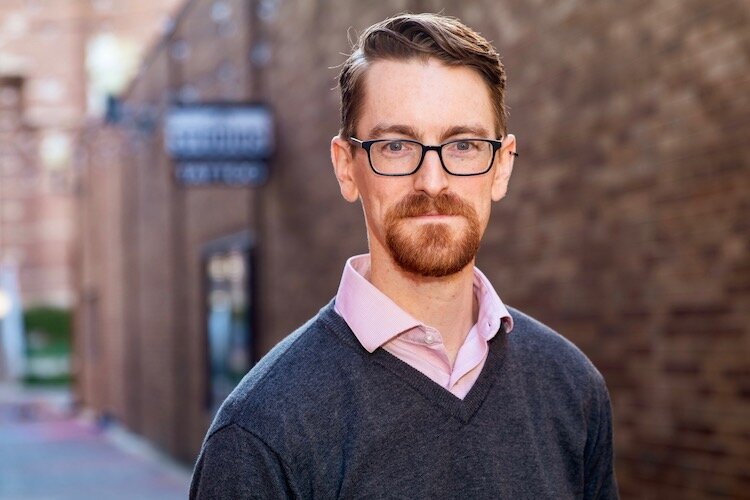New state program paired with local funds help tax-delinquent homeowners in Kalamazoo County
The Michigan Homeowners Assistance Fund program was created last year to prevent homeowners from losing their homes as a result of mortgage delinquencies the program and was established under the American Rescue Plan Act of 2021 to mitigate hardships associated with the pandemic. Kalamazoo County Treasurer Thomas Whitener tells how it can work for county residents.
This spring Kalamazoo County is going to start to see the negative effects the COVID-19 shutdown had on area homeowners.
“Like most things that have occurred during this pandemic, COVID was sort of a story of two sides,” says Kalamazoo County Treasurer Thomas Whitener. “The people who maintained employment, who had a mortgage, who were on the wealthier side of the economic spectrum, were able to refinance, were able to realize some benefits from the lower interest rates.”
But he says, “Those on the lower end of the spectrum — where people were working in those jobs where they were front-line workers, where they were expected to be interacting with the public or other people, or where their jobs were simply eliminated — we saw a lot of effects.”
He says some suffered hardships because their employers didn’t reopen for a long time. Others were afraid to return to work fearing they would get sick. And some employers never reopened.
“Many of those who got sick were out of work for an extended period of time,” Whitener says, “Which means they weren’t drawing a paycheck and weren’t able to meet their financial obligations or maybe the breadwinner of the family got sick and passed away.”

In the meantime, April 1 of 2022 is Foreclosure Day for those who have been unable to pay their 2019 taxes. That bill would have originally come due on Feb. 28 of 2020. Mortgage companies collect property taxes and escrow them each month for most homeowners, Whitener explains. At the end of the year, they pay the taxes automatically to taxing jurisdictions. But when a home is owned outright, the tax bill goes directly to the property owner. And if his or her annual payment is delinquent, a process of forfeiture and foreclosure begins. That process takes three years.
“Tax foreclosure, because of that three-year process, is a lagging indicator,” Whitener says. So problems homeowners had paying their taxes in 2019 will start surfacing this year.
But he says a program administered by the Michigan State Housing Development Authority (MSHDA) is helping homeowners pay their delinquent property taxes as well as mortgages and other housing-related debts that are delinquent as a result of hardship related to the COVID-19 pandemic.
The Michigan Homeowners Assistance Fund program was created last year to prevent homeowners from losing their homes as a result of mortgage delinquencies, foreclosure, loss of utility services, insurance escrow shortages, or displacements that occurred on or after Jan. 21, 2020.
Launched on Feb. 14 of this year, it is making up to $25,000 in assistance available to individual homeowners.
“We are seeing a lot of people coming in and we’re giving them this information,” says Stephania Brown, a senior account clerk with the Treasurer’s Office.
She says the application process opened on Feb. 14, “and by February 22nd we already had people who had been approved. … That’s a very quick turn-around. So if a person put in their application and they get approved, they’re giving us that money right away because they’re trying to make sure nobody loses their home.”
Called MIHAF, the program was established under the American Rescue Plan Act of 2021 to mitigate hardships associated with the pandemic. It has provided the State of Michigan with $242.8 million to help homeowners who meet certain qualifications. Those are homeowners with household incomes of less than 150 percent of the Area Median Income ($41,774 per household in 2019); who own and occupy their property as their primary residence; and who have and can explain a financial hardship directly related to COVID.
“A homeowner must have experienced and attest to a qualified financial hardship on or after Jan. 21, 2020 or had a qualified financial hardship that began before Jan. 21, 2020 but continued after that date,” according to information on the MIHAF website.
Qualified financial hardships include having a material reduction in income or material increase in living expenses associated with the coronavirus pandemic.
Information on the program is available at the MSHDA website.
The assistance can be used to pay:
• Delinquent mortgage/housing expenses, including property tax and insurance escrow shortages;
• Delinquent land contract payments, mobile home consumer loan payments or mobile home park lot payments;
• Delinquent property taxes;
• Delinquent condominium/homeowners’ association fees; Delinquent homeowner’s insurance;
• Delinquent utilities, gas, electric, water, sewer; and Delinquent internet broadband services.
“We are a partner in the program,” Whitener says, “which means we are receiving payments from the program and helping people get into it. … And so we are working with people to provide them with information that they need to get into the program.”
Questions about the program may be answered by calling 844-756-4423 or by sending an email to the program here.
“We have been putting into the pipeline and as far as I can tell, we’ve got 20 to 30 people who have already signed up,” the treasurer says. “The MSHDA program was expecting a two-week turn-around (in processing requests). It seems like the interest in the program has been so great across the state that that is expanded out now to four or fine weeks, which is fine.”
When the Treasurer’s Office is notified that a person has been accepted into the program, it holds their property from foreclosure “so homeowners can stay in their homes,” Whitener says. “And we’re doing that even for people who have taxes that are too old to be covered by the program.”
The program is paying delinquent taxes for 2019, 2020, and 2021. “And they will pay them off in full,” Whitener says. “They’re offering up to $25,000 per household, which is a huge benefit … for the large majority of taxpayers who are behind on their taxes, that’s a full clear. That will take them all the way to current on their property taxes, which is an amazing help and is serving to help take some people who would struggle to ever make it out of the hole of compounding interest and getting them up to current and putting them in a situation where they can start to focus on some of the other priorities that they have.”
The county is not forgiving previous taxes, Whitener says. But for homeowners who qualify for the program and have outstanding tax bills for 2017 or 2018, he is still withholding their property from foreclosure because MIHAF will satisfy their 2019-2021 bills and “I’m going to work with them to find other resources to take care of those older taxes or to form a payment plan where they can catch up and get on top of them finally.”
Other resources include help for military veterans through the U.S. Veterans Administration. For people on food assistance or who have a DHS account, they may qualify for up to $2,000 in assistance for back taxes. The county is working with KNHS
He says his office is also working locally with Kalamazoo Neighborhood Housing Services Inc. “which is doing some great work with grant proposals that they’ve received from the American Rescue Act as well as other philanthropic organizations. And then we have some help coming from the Foundation for Excellence here in Kalamazoo, for help within the city.”
Last week there were 327 parcels facing tax foreclosure. Of those, 133 have been identified as the owner’s primary residence. But that is well reduced from about 1,200 parcels that were headed into foreclosure when Whitener took office in January of 2021. Of those, about 800 were the owners’ primary residences.
“We try very hard to get that number to zero every year,” Whitener says.
Of last year’s foreclosure parcels, he says his office was able to reduce the number to 25 foreclosures. None of them was an individual’s primary residence. That was possible by connecting people with services, establishing payment plans, and working with people to help them make strides to get on the right side of the ledger.
There also is a hardship extension, a one-year extension based on a demonstrated hardship that’s occurred to the property owner.
“I’m going to do everything in my power to make sure that we have the minimum number of foreclosures possible,” Whitener says. “That’s critical for me. But what I’m expecting us to see (soon) is more people who are in danger of foreclosure, more people who need access to these grant programs, these assistance programs, more people who need to be given the hardship extensions that we offer. … More people on payment plans. And payment plans that are lower than they would be in better times.”

















